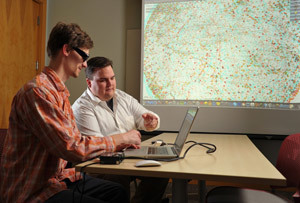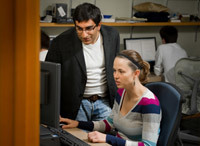 Graduate students Anthony Strathman and Ryan Lichtenwalter work with a 3-D visualization of cell phone networks.
Graduate students Anthony Strathman and Ryan Lichtenwalter work with a 3-D visualization of cell phone networks.
Red lines in the carpet connect the orange and yellow dots in the third-floor Nieuwland Hall headquarters of the University of Notre Dame’s Interdisciplinary Center for Network Science and Applications (iCeNSA), a network of researchers studying networks in the real world.
The lines are not limits, but rather connectors to greater knowledge and greater good. iCeNSA is a connector and a hub whose interdisciplinary work and faculty affiliates span computing, science, engineering, mathematics, social science and humanities. Nitesh Chawla of computer science and engineering is director of the center, with co-directors Michael Ferdig of biological sciences, David Hachen of sociology and Zoltán Toroczkai of physics.
The multidisciplinary approach, reaching into education and service as well as research and science, puts iCeNSA on the leading edge of an accelerating trend in universities and other enterprises.
“iCeNSA has changed forever the way I do research,” Hachen says. “Because of iCeNSA I now work on teams of faculty, graduate students, postdocs, professional specialists and undergraduates from science, engineering and the social sciences.”
Participants include undergraduates, graduate students, postdoctoral fellows and faculty from across the campus, a synergistic mix that spawns ideas, insights, projects, papers, grants and prizes across fields without fences.
 Director Nitesh Chawla works with a student.
Director Nitesh Chawla works with a student.
“Students from different disciplines co-situate in the center,” Chawla says. “We want to make it open. We want the space to be open, we want the students to be open, we want it to be a free flow of thoughts and ideas that emerge and develop from that perspective.”
“For me, a physicist by training, iCeNSA forms the natural environment for cross-fertilization of ideas, and it has opened my eyes to a large number of real-world problems where physics-based thinking and tools can successfully be applied,” Toroczkai says.
ICeNSA’s research and pedagogical activities are a testament to the multidisciplinary mission, funded by an array of federal agencies and corporate sponsors. Some of the representative research themes include:
- Social networks. Socials scientists are working with computer scientists and physicists to understand the dynamics of human interaction networks, such as cell phone communication networks and online social networks.
- Health care analytics— ICeNSA is making transformative advances in personalized health care by intersecting computing with social networks. ICeNSA faculty and students are collaborating with South Bend health care providers, health exchange and community organizations for cost-effective delivery of health care with a focus on patient-centered outcomes.
- Big data— ICeNSA faculty study fundamental algorithms for big data and networks, a field in which the agency expects to foster new ways of thinking.
- Climate and environmental sciences— ICeNSA faculty, in collaboration with faculty from different departments and the Environmental Change Initiative, are working on grand challenge problems in adaptation to climate change and invasive species.
- Systems biology and biological networks— In close collaboration with the Eck Institute of Global Health, iCeNSA faculty are working on grand challenge problems in systems biology, drug discovery and their impact on global health issues. Students from biology and computer science, co-located in iCeNSA, collaborated on winning first place in in IBM’s international Dialogue for Reverse Engineering Assessments and Methods (DREAM) Challenge.
“Computational and statistical methods of network science developed at iCeNSA offer novel and immediate opportunities to organize, integrate and sift these data in unbiased and comprehensive ways to find causal mechanisms of diseases and new avenues to treat them,” Ferdig says.
Along with reaching across traditional university boundaries for research, Chawla says, iCeNSA has a strong focus on education and outreach, with some activities including:
- The health care analytics class taught by Chawla has students from different departments — computer science, business, biological sciences and psychology
- Participation by a high school student and high school teacher in the adaptation to climate change project
- Close collaboration with community health care providers, hospitals and health exchange, with Chawla serving on the Board of Managers of the Michiana Health Information Network
- Start-ups at Innovation Park
“This center is sort of a hub,” Chawla says. “We know interdisciplinary science is the future. We’re making a network of disciplines together to advance science, to advance the mission of the University and do research that makes a difference to the society.”
Contact: Professor Nitesh Chawla, nchawla@nd.edu